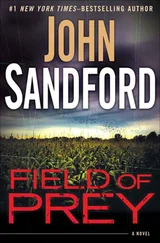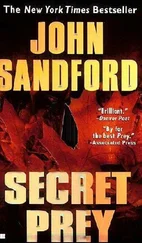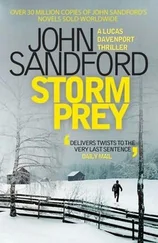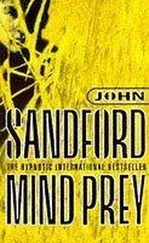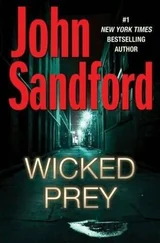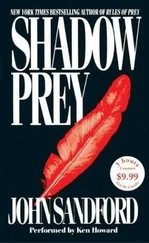Larry was still there when he woke up, still high; Bill was still passed out, and might have been dead. Somebody should check. Chuck was lifting a weight in the kitchen: it was a dumbbell, and there was only one, so he was changing hands with it, and was drinking Campbell’s Tomato Soup straight out of the can.
They pulled as many details as they could from him, and when they were done, Lucas turned to Bennett and said, “We’re going to check on this. See if the deputies will put him in the drunk tank by himself, at least until we go into this place. Tell Jamie we’ll send him a note.”
“You believe him?”
“He’s pretty obviously a miserable dirtbag liar and a piece of low-life scum, but, he had a lot of detail,” Lucas said.
Clay said, “Hey, I’m sitting right here.”
Lucas said, “Just kiddin’.”
• • •
BACK OUTSIDE, Del called a friend on the Minneapolis narcotics squad and asked about the chance of a raid that evening on Joan What’s-Her-Name’s, and was told that it’d be a problem: too many people were off, and overtime and everything. Del asked if Minneapolis would mind a BCA raid, and after a little talk, everybody agreed that it would be okay. One of the Minneapolis guys, who was working anyway, would ride along.
Lucas told Del, “Set it up. Late as you can—we’d like to get the same cast of characters, if we can.”
“Probably go for eleven o’clock,” Del said.
Lucas went home for supper and found Virgil Flowers sitting at his kitchen table, a black felt cowboy hat to one side; he was drinking a Leinie’s.
“How was Albuquerque?” Lucas asked. Flowers should have been arriving there in an hour.
“You got me a ticket on Delta,” Flowers said. “What do you think happened?”
“The plane broke?”
“Exactly. They’re bringing another one in from Chicago. Revised departure time is ten o’clock, assuming that the replacement plane makes it this far. They’re probably bringing it in on a truck. Anyway, I won’t be interviewing anybody tonight. Since your house was close by . . . and I hadn’t had dinner . . .”
“We’re having meat loaf,” Weather said.
Flowers said, “Mmmm, mmm.”
• • •
AT DINNER, Weather asked Lucas for a summary of the case. He put his fork down and said, “Nothing’s clear. One of Grant’s bodyguards, or both of them working together, probably killed Tubbs and probably killed Helen Roman.”
“Are you going to clear it up tomorrow?”
“No. I might know something tomorrow, but whether I’ll have a court case . . . whether I’ll ever have a court case . . . that, I can’t say.”
“If you find out tomorrow before four o’clock, call me,” Weather said. “Otherwise, I’m going to vote for Taryn Grant.”
“I already did,” Flowers said. “I mailed in my ballot last week.”
Lucas said, “The thing that plagues me is, she might know something. She might even be involved.”
“Do you care that much? You’re as cynical about government as anyone I’ve ever known,” Weather said.
“I’m not that cynical,” Lucas said. “I’m cynical about the fact that there are so many little payoffs going around all the time, so many little deals, that the legislature is greased by corruption.”
“I think you overstate the problem.”
“No, he doesn’t,” Flowers said. “The legislature runs on corruption. But a killer in the U.S. Senate . . . an actual murderer? The prospect is the tiniest bit disturbing.”
CHAPTER 21
Flowers went to Albuquerque, and Lucas went on the raid, which wasn’t that much of a raid, as raids went.
The target house, the “red house,” halfway down Minneapolis’s south side, was owned by an obscure real estate investment group and rented to a thirty-one-year-old woman named Joan Busch, who was known by half the Minneapolis cops who worked the neighborhood. She’d once been a minor terror in the clubs, according to the Minneapolis vice cop who rode with them, but had gotten older and given up fighting.
She sold dope when she had it—marijuana—but more often, simply provided people with a warm place to party, as long as she could party along. She had a fifteen-year-old daughter who lived with a guy allegedly named Crown Royal, but, more importantly, brought in a child-support check.
“Nasty woman. Nasty,” the vice cop said. “But, she won’t let guns in her place, because she’s afraid somebody’ll shoot her nasty ass.”
Lucas and Del were in Lucas’s Lexus, with the vice cop, driving circles around the neighborhood, waiting. Lucas had supplied the BCA’s SWAT team, which had scouted the location. The raid was supposed to go at eleven o’clock, but, as usual, things came up, and people ran late, and when Lucas turned the corner at eleven-forty, he saw the first of the SWAT guys go through the front door.
“There we go,” he said.
“That door’s been busted down so many times, you could open it by breathing on it,” the vice cop said.
They parked directly in front of the house, behind a SWAT van, and Lucas, Del, and the vice cop ambled across the lawn and up the porch steps. Joan Busch was sitting on a ratty brown couch, looking both high and discouraged. Five men and a woman were facing a couple of different walls, hands on the walls, and had already been patted down. One man lay behind a couch, unmoving. The whole place smelled like weed, like an old motel room might smell of cigarette smoke.
“What happened to him?” Del asked, nodding at the unconscious man.
“He was like that when we came in,” the SWAT leader said. “He’s breathing, but he’s not waking up. We’ve got an ambulance on the way.”
“Must be Bill,” Lucas said.
All seven of the house’s inhabitants were stoned to some degree; when Lucas checked IDs, he found a Michael and a very, very white guy named Joe. The other woman, whose name was Charlotte Brown, said that she lived upstairs. Lucas told her to sit on the couch next to Busch, and then, after talking to the vice guy, they cut loose everybody except the two women, and Michael and Joe.
The freed men were taken outside one at a time by the vice guy, so that he could tell them that they were being released on his say-so, and that they owed him big time. A few minutes later, an ambulance showed up, and the unconscious guy was trundled out.
When that was done, Lucas and Del took the other four into the kitchen, one at a time, for questioning.
Michael and Busch were confused about the night that Clay was supposed to be in the house. They thought they might remember him, but were not sure exactly of the when: “That sucker comes and goes,” Busch said. “In and out all the time.”
He’d never come in the house with a gun, Busch said, “Because he knows if he do, that’s the end of him. I throw his ass out and never let him come back. Cops don’t mind a little weed, but they death on guns.”
Brown, though, remembered something about Clay trying to start a game of strip poker. “I said, ‘You so short, why’d I play strip poker with you?’ and he said, ‘Only my body short, ’cause all my growth went somewhere else.’ Made me laugh, but I said, ‘I ain’t playin’ strip poker with nobody in this house.’”
She said he was still there when she went upstairs, sometime well after midnight, but was gone when she came back down about noon.
Joe remembered him, too. “He was sleepin’ on the floor when I got up. He was snorin’ like a chain saw, you could hear him out in the street.”
That was at six o’clock in the morning, or thereabouts. “I got to be to work at eight o’clock so I set my phone at six o’clock so I could go home and get washed up. The phone went off and he never moved, he snored right through it.”
Читать дальше

